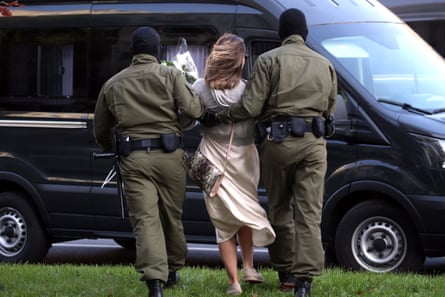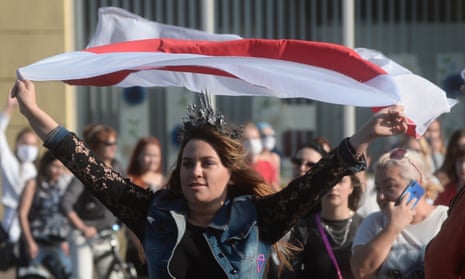Belarus’s foreign minister, Vladimir Makei, has accused western countries of attempting to sow “chaos and anarchy” in the former Soviet republic, which has been rocked by street protests since a contested election last month that was claimed by President Alexander Lukashenko.
“We are seeing attempts to destabilise the situation in the country,” Makei told the UN general assembly in a video statement on Saturday. “Interference in our internal affairs, sanctions and other restrictions on Belarus will have the opposite effect, and are harmful for absolutely everyone.”
More than 12,000 people have been arrested since Lukashenko was declared the landslide winner in the 9 August election that the opposition denounced as rigged.
The US, Britain and Canada were expected to impose sanctions soon on Belarusian individuals over what those governments view as a rigged election and violence against peaceful protesters, sources have told Reuters.
“Statements brimming with cynicism have been made by a series of our western colleagues about their alleged concern for Belarusian sovereignty and wellbeing,” Makei told the UN. “In actual fact they are nothing other than attempts to bring chaos and anarchy to our country.”
Makei’s comments came as the French president, Emmanuel Macron, told the weekly Journal du Dimanche that Lukashenko had to step down.
“It’s clear he has to go,” he told the weekly publication on Sunday, speaking days after the European Union refused to recognise Lukashenko as the Belarus’s legitimate president.
“It is a crisis of power, an authoritarian power that cannot accept the logic of democracy and which is hanging on by force. It is clear that Lukashenko has to go,” he said.
Tens of thousands of people have taken to the streets in Belarus since the elections, which opposition leader Svetlana Tikhanovskaya said she won, despite Lukashenko’s insistence that he took a landslide victory.
The embattled leader’s brutal crackdown on protesters has drawn condemnation from the West but support from Moscow.
Lukashenko recently triggered new demonstrations and fresh Western criticism after holding a secret inauguration for himself.
Macron said he had been “impressed by the courage of the protesters” in Belarus.

“They know the risks they are taking by demonstrating every weekend, and yet, they are pushing forward with the movement to make democracy come alive in this country that has been deprived of it for so long,” he said.
“Women in particular, who march every Saturday, command our respect.”
More than 90 people – most of them women – were arrested on Saturday at opposition rallies, one NGO said.
The EU on Thursday said Lukashenko’s inauguration lacked “democratic legitimacy” and refused to recognise him as president.
Brussels is reviewing its relations with the country, the bloc’s diplomatic chief has said.
EU ministers decided in principle last month to impose sanctions against the regime, but Cyprus has been blocking approval until the bloc agrees similar measures against Turkey over gas exploration in the eastern Mediterranean.
On Friday, EU Baltic states Lithuania, Latvia and Estonia expanded their own sanctions against Belarus.
The issue will be debated during an EU summit on 1-2 October in Brussels.
On Friday, EU council president Charles Michel told the general assembly in his own video speech that repression and intimidation must stop and those responsible must be held accountable.
“We stand with the Belarusian people who must be free, without any external coercion, to choose their own future,” Michel said, calling for inclusive national dialogue facilitated by the Organisation for Security and Cooperation in Europe.
